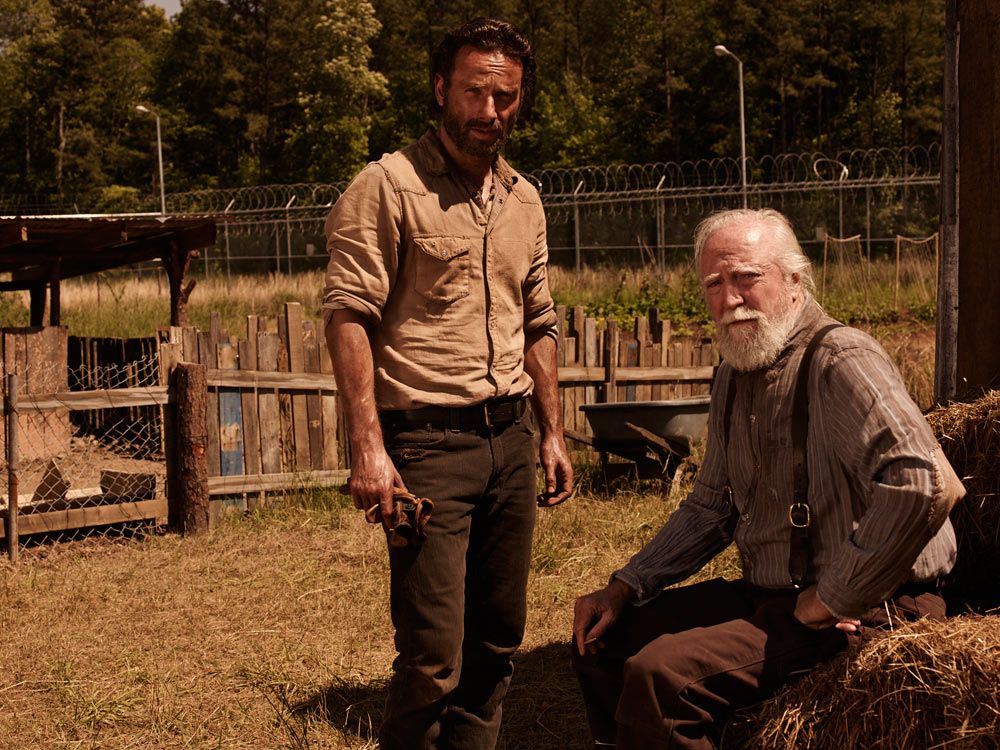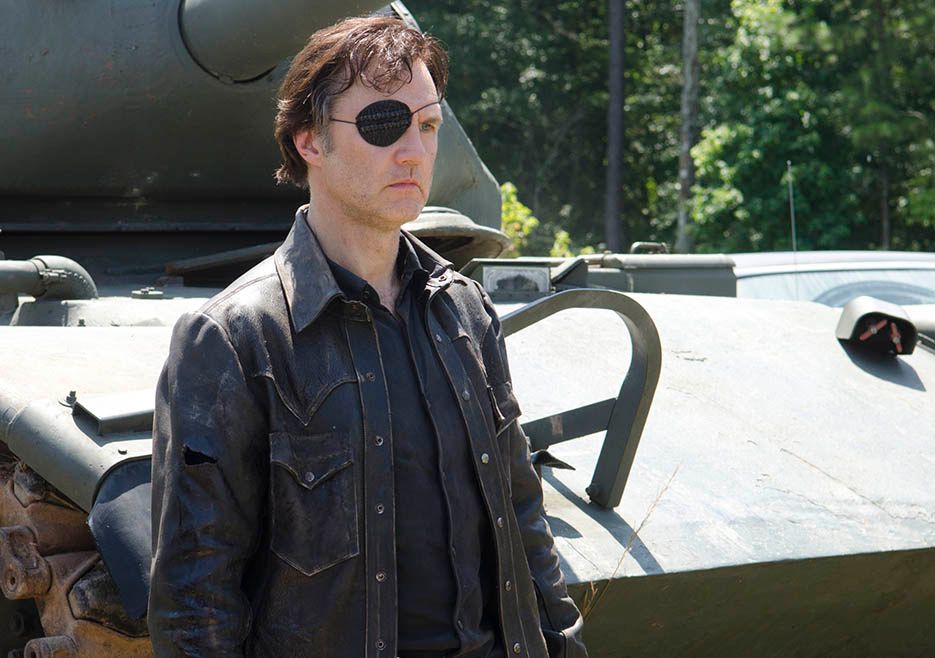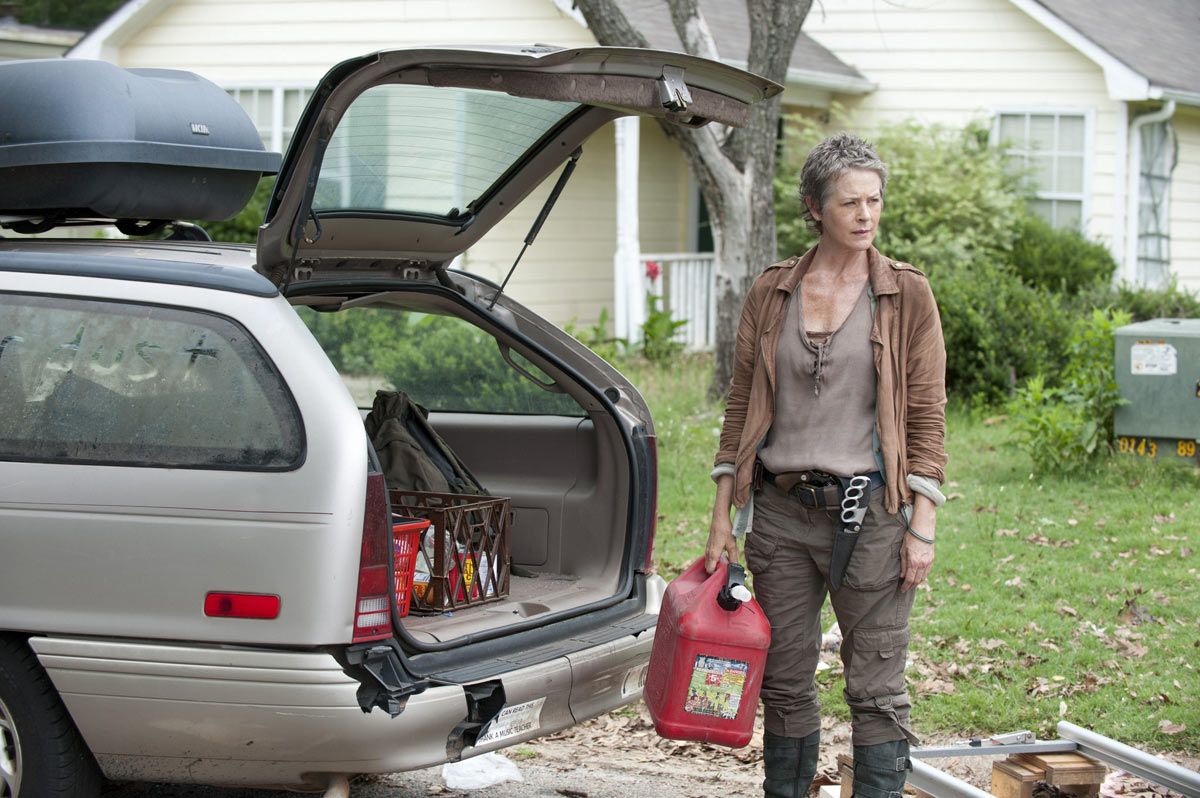When told that many fans of AMC's "The Walking Dead" are slightly upset with Robert Kirkman and his crew after last week's mid-season finale, the writer feigns shock. "What did I do?" Reminded that he killed off a number of characters, including fan favorite patriarch Hershel Greene, Kirkman knows exactly how to respond. "Come on," he says. "Don't people know what show they're watching by now?"
Indeed, the deaths that made up the core of Season 4's midway point were exactly the kind of brutal ends fans of both the TV show and the Image Comics series have come to expect. From Hershel's gruesome falling at the slash of the Governor's sword to the one-eyed villain's own (slightly more cathartic) end, spilt blood is part of "The Walking Dead's" stock in trade. But beyond their shock value and the impact they have on fans in a visceral sense, the events of "Too Far Gone" -- which took its name and general plot from different sections of Kirkman and Charlie Adlard's comic run -- also leave questions open as to where Rick Grimes and his group go next.
RELATED: "The Walking Dead's" Most Shocking Season Four Moments - So Far!
CBR News spoke with Kirkman about the finale, and the writer explained how the path to the final, tank-led battle not only set up the death of Hershel, the loss of Judith and the breaking of the group, he also digs into the theories that the show writers, led by Scott Gimple, use when taking pieces off the board, like the now-absent Carol. He also teases what comic fans should divine about what comes next on television from their own reading experience while showing how his TV work has played into the current, massive "All Out War" story he and Adlard are rolling out in during the comic's tenth anniversary.
CBR News: Robert, the mid-season finale of "The Walking Dead" was shocking for a lot of fans due to the high body count, and, to me, the way it ended felt almost like a true season finale. In other words, it went out with a huge bang and wrapped up a majority of the storylines rather than wrapping on a major cliffhanger of some sort. Did you discuss this in the writer's room as being more of a stopping point than a pause?
Robert Kirkman: We knew at the beginning of the season that we were going to wrap up the prison storyline in these eight episodes, so I guess by design that had to happen. [Show runner] Scott Gimple is a huge fan of the comic series and was reading them before the show ever existed, so he really wanted to work in that giant, climactic prison battle and have that be the way the storyline wrapped up. Since we always knew that we were building towards that, we knew it would be kind of an explosive, giant episode in general, and it just worked out that it almost made for a great mid-season finale.
But, yeah, we did want to pull out all the stops there and do something really big and cool. And don't worry. There will still be something big for the true Season 4 finale. But it felt right to do it this way.
People who have read the comics know that not everything on the show played out exactly as it did on the page, including the death of the Governor. How do you continue to approach that challenge of what to keep and what to change from the comics, and has that job gotten more complex as you've gone along?
The exciting aspect of all that is that it's a real natural process. We have eight writers who work on the show, and we get together in a room to talk about crafting a season of television based on the comic book series. All of these are really intelligent, really creative people, so it's not always a matter of sitting down and debating what we're going to change or not. It's really a matter of us working out exactly what happened in the comics -- what that story was -- and then getting at how we're going to apply it to what came in the show before. There are a lot of characters who died earlier or die later or even aren't in the comics, like Daryl Dixon. These are all x-factors that naturally change the story in organic ways. It's that process of trying to make the story fit and work in the context of the show and what we're building in the show that ends up leading to those little changes. Or, sometimes, it leads to stories or moments that are directly adapted from the comics. It's a fun process, and it's a long process. It's not effortless, but it does kind of happen naturally over the course of the day's work.
Hershel's death was probably the one that hit folks hardest when it was on screen, and it's the latest example of your giving a very brutal sendoff to a very beloved character. When you know you're going to kill a character like that, what's the goal? Do you want to make it extra awful? Is there a perverse amount of glee in that?
It's not necessarily a perverse amount of glee, though there's maybe a little bit. [Laughs]
What I'll say is that it's a matter of -- an important character deserves an important death. A memorable character deserves a memorable death. And a beloved character deserves a horrific death, just because of how much they're liked. That's a thing that makes sense to me, though I guess it sounds weird to other people. You want people to be upset about a character's death when they love that character. Whether it be Hershel in the TV show or Tyreese in the comic books -- spoiler alert for people watching the show, I guess! -- I really just want the death to be as emotional as possible to honor the death of that character. It's not really a matter of trying to manipulate people or make people upset; it's really just about trying to hold it all together with some kind of emotional core. We want to make it seem as though the character's life was building towards something monumental that's really going to affect that other characters too. There's a lot that goes into it.
On the other side of that episode, we have the question of baby Judith as a character. Honestly, at this point she's more of a plot device than an actual character, but her presence on the show was a very different thing than the comic already. With a scene where we only see a bloody car seat, it certainly seems like she's dead, but I have to ask: Did you shoot it like that to not be the show that killed a baby, or is there a chance that she may still be alive?
It's certainly shot in a way that facilitates what comes next. Unfortunately, I can't reveal what that "next" is. It's entirely possible that that baby is dead, and it's entirely possible that that baby isn't. We'll just have to wait and see. What I will say is that whatever changes we've made to that storyline is done to initiate some really cool stuff moving forward. There's always a reason to why things have been changed or kept the same, but that's a really tough one to answer. We are keeping things a little bit ambiguous on purpose [regarding] Judith's well being or lack thereof. We'll just have to see, but we definitely have a plan.
Should "The Walking Dead's" Zombie Apocalypse Be Over By Now?
On the non-death side of the show, there's Carol being banned from the group by Rick. In a comic, if you write a character out like that, it's possible to bring them back years later. But on TV, I imagine letting that story come back is trickier due to the availability of the actress and contracts and all that. It's been impressive so far, how you've been able to hold off on returns like Merle's for so long. Overall, do you think of these things in terms of, "How long can we hold this person off screen before the audience will be upset at us for not showing them?"
It really all comes down to planning. Yeah, it's a little bit more difficult to do on television, but we never really lose track of a character without knowing exactly when we're going to pick them back up. That's really the key. Even before we had written Carol's exit from the show, we knew how and when she was going to return. With a character like that, we're not ever really going to have it be, "That's the last we'll see of them," without having it be set up as the definitive last time we'll see them. When we leave it hanging, it's with a return in mind. That's something work out in advance with characters like Merle, Carol and Morgan, but it's really all about planning. I'm happy to say that with Scott Gimple and everyone else we work with on the show, it's an idea we work hard at.
So you're never going to pull a "Sopranos" and have the Russian run off into the woods, never to be seen again?
[Laughs] You never know!
Looking forward, what can you even say about what's next, considering the definitive end of the last episode? The clip from Season 4, Part 2 that you showed during "Talking Dead" last week was essentially Carl playing bait, a game which never ends well.
The thing I'll say about that scene from "Talking Dead" specifically is that that particular scene gives away quite a bit for the comic book fans. You can go and find that scene in the comics, panel-to-panel. That should give you a little bit of insight as to where we're going in the back half of the season. I'd encourage all the comic readers to try and do that work.
What lies ahead for Rick in his quest to not be the leader, but be a farmer?
That definitely has been blown out of the water. It's really taken all of these conveyances of, "Hey, we are people again, and there's a society with a council that keeps us safe! We can plant crops and worry about other things!" away, too. Coming into the back half of Season 4, we've stripped all of that away and put the characters back into the mode of, "I've got to hide and find food. Let's keep moving. I don't know where my friends are or if they're alive or dead." It's really that we're going to be coming back to the show in a time when characters are at their most vulnerable. That lets us do some really interesting things. Having it all stripped away and getting back to the core of survival in this world asks, "Will they rebuild again? Do they find another place? Are they going to find each other or stay separate for an indefinite amount of time?" These are all questions that are going to be driving the back half of the season and, I think, keep things very fresh and very interesting.
Another running theme has been that whenever someone dies, new cast members step into the breach and become a big part of the action. I know Lily has arrived with the death of the Governor, but in general, are you looking to expand when the show returns?
Definitely. We're always excited about the additions to the cast and injecting new blood into the show. You've got a lot of stuff coming with Abraham, Eugene and Rosita, who are being added to the cast at some indeterminate point in the back half of Season 4. We'll have to see when that happens. It's important to keep things moving on this show and to keep changing it up. We're always trying to add new elements.
On the comics side of things, "All Out War" is underway, showcasing the longest continual story you've done in the series to date. While you've had a lot of long-simmering plots over "The Walking Dead's" history, this feels significantly different. I was wondering if the long-form nature of television storytelling has impacted how you're approaching the comic.
Definitely a little bit. The amount of work that went into shaping "All Out War" before I even started writing the issues is definitely a by-product of working on the show and kind of falling in love with the idea of doing outlines and things that I never did in the comics before. Really, it's just a matter of "All Out War" being the biggest storyline that I've ever tried to do in "The Walking Dead," and that meant I had to change a little bit about how the stories are told in the book to accommodate the scale of this. It's a fun undertaking. Plus, it's really important to me to remain focused on the comics despite the show's existence and despite "The Walking Dead" growing into this huge event. Doing 12 issues over the course of eight months or whatever it is just shows how committed Charlie Adlard and I are to the comic book. It shows how invested we are in continuing this story in its original form.
"All Out War" continues in "The Walking Dead" #118, on sale now. "The Walking Dead" returns to AMC in February.




